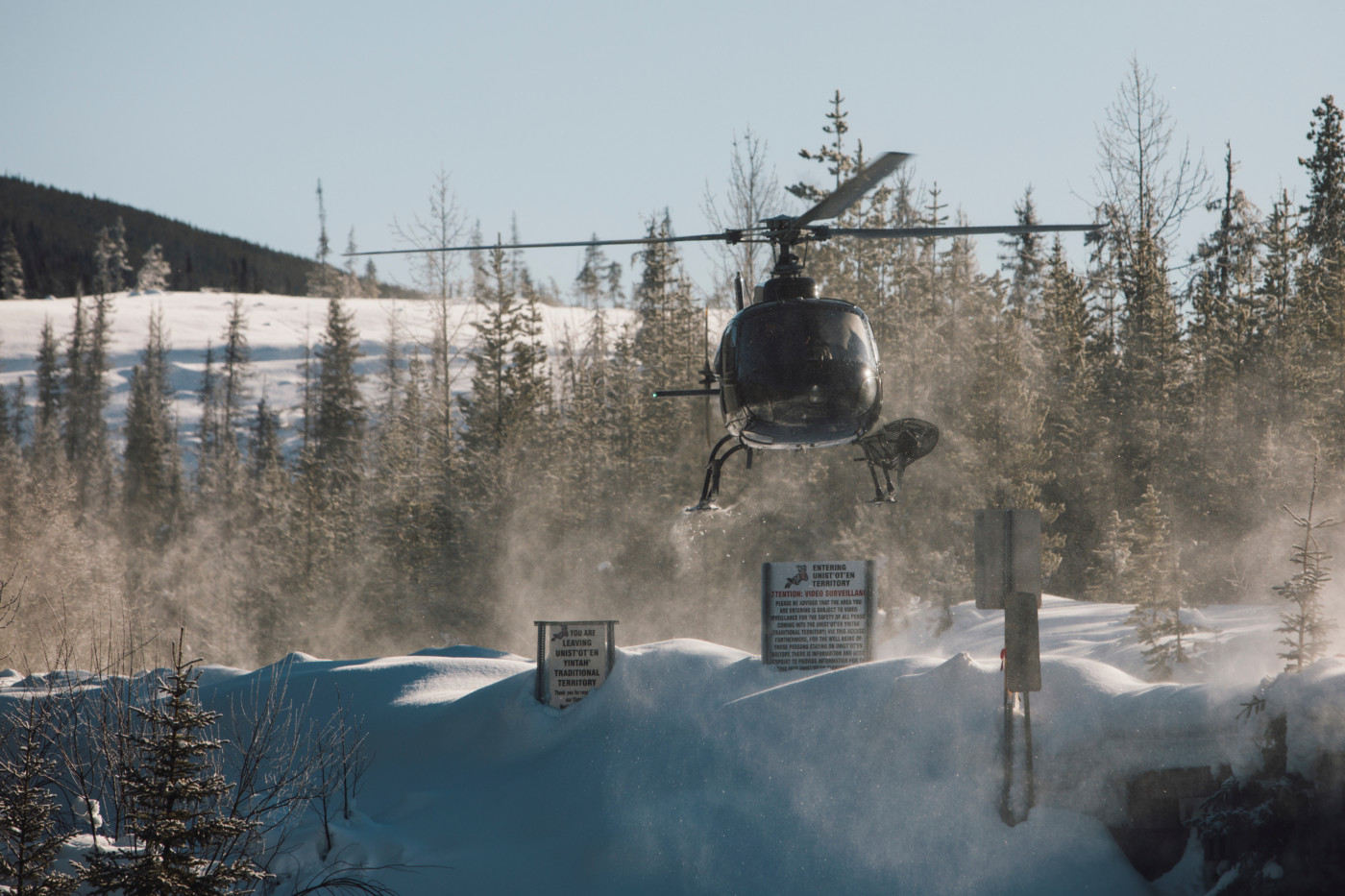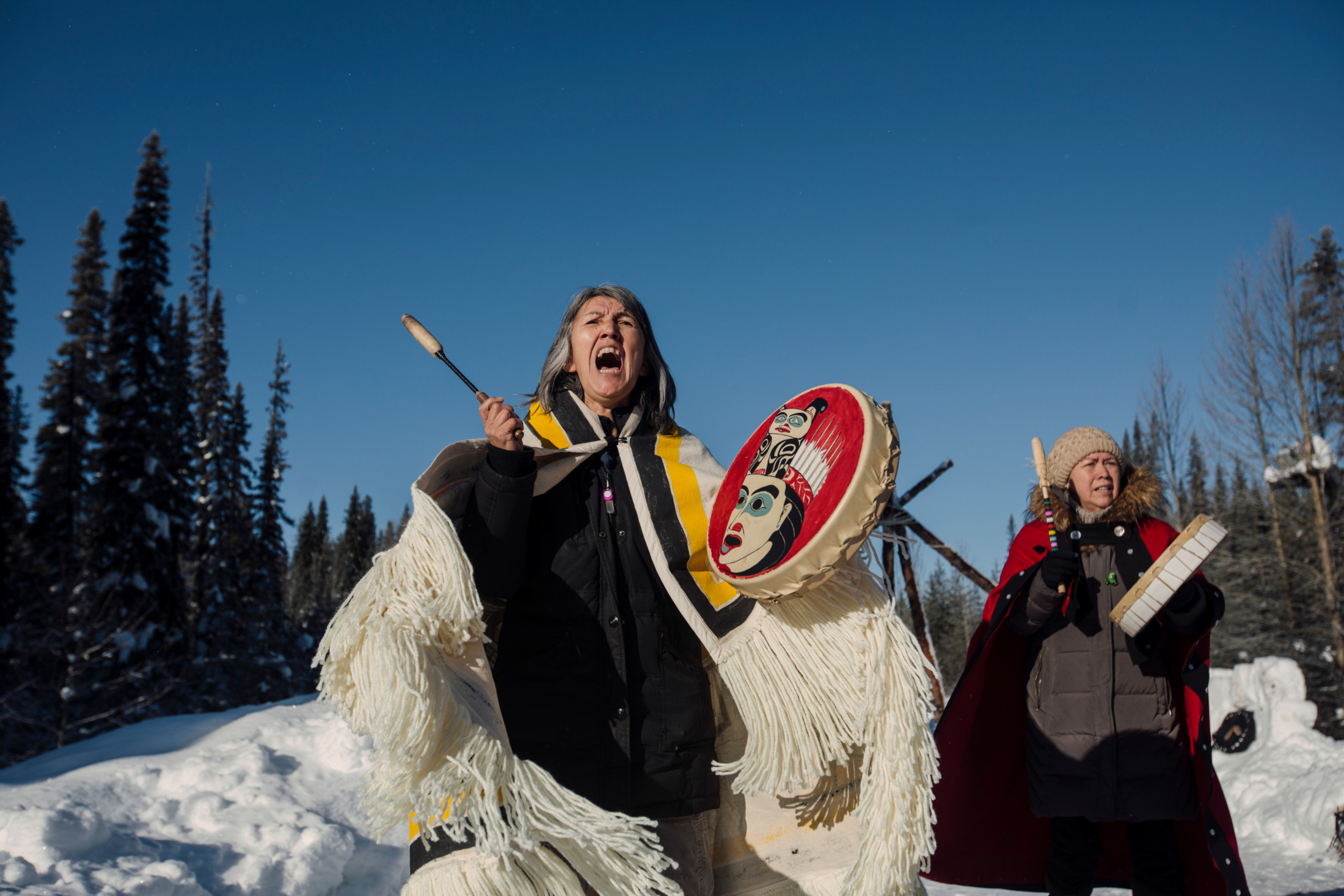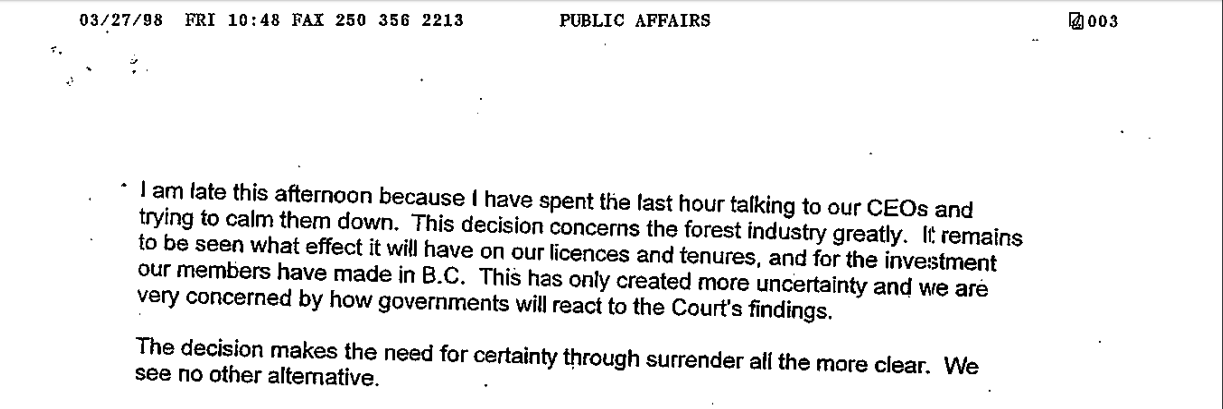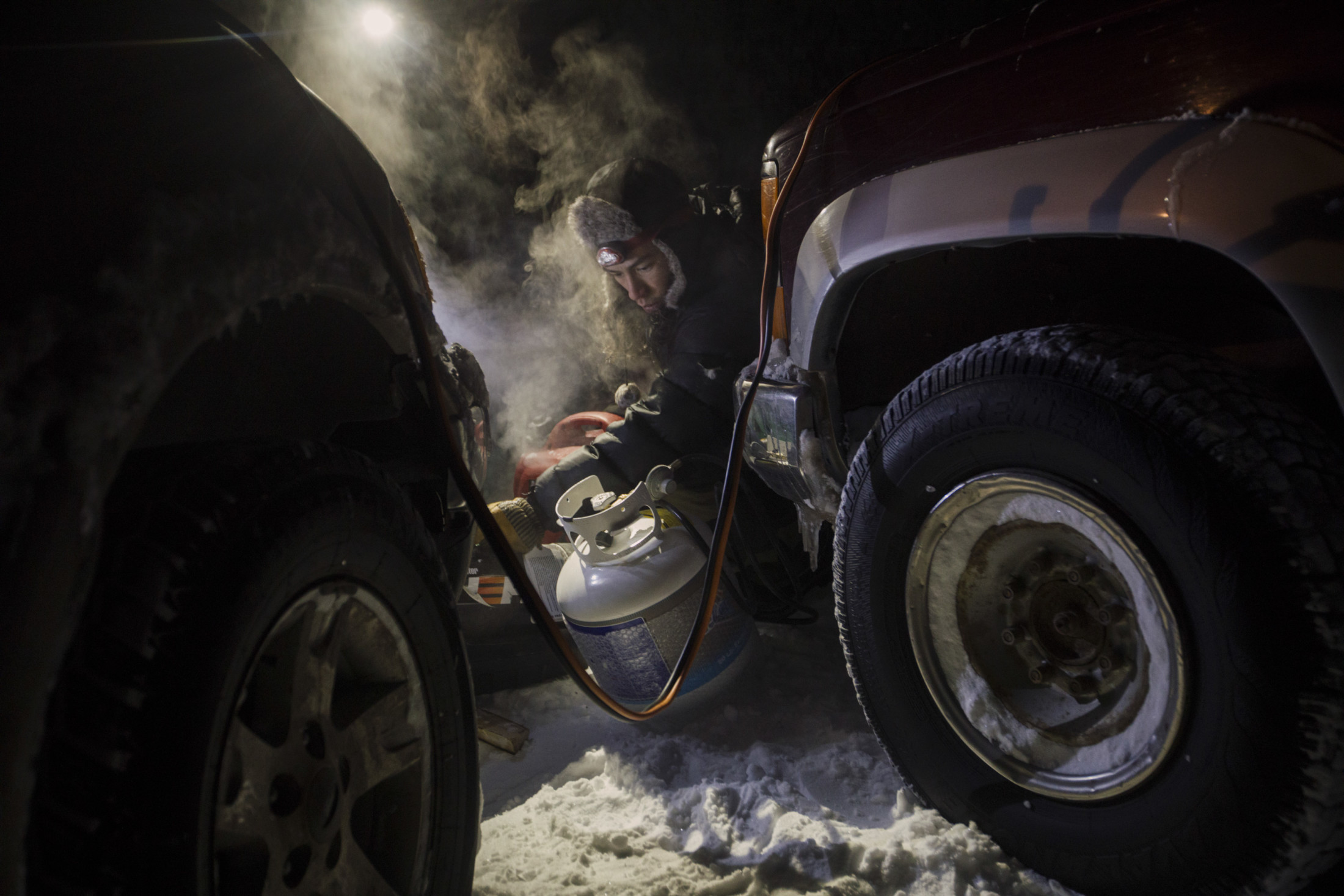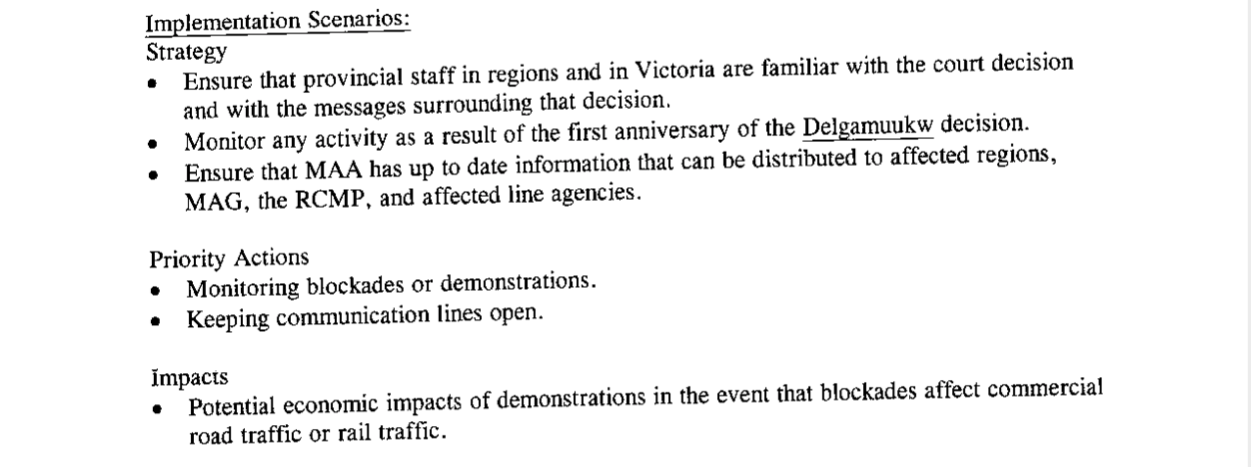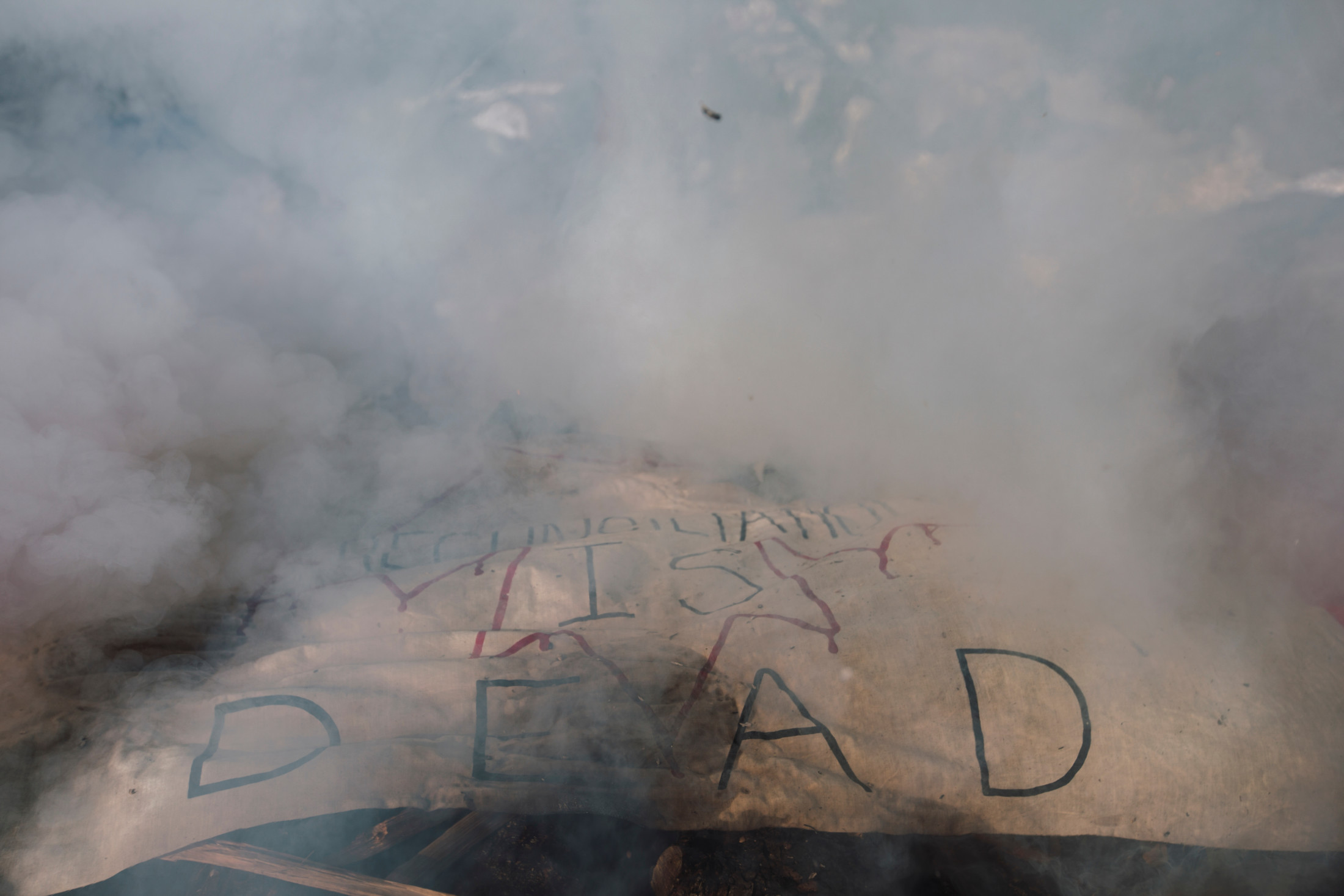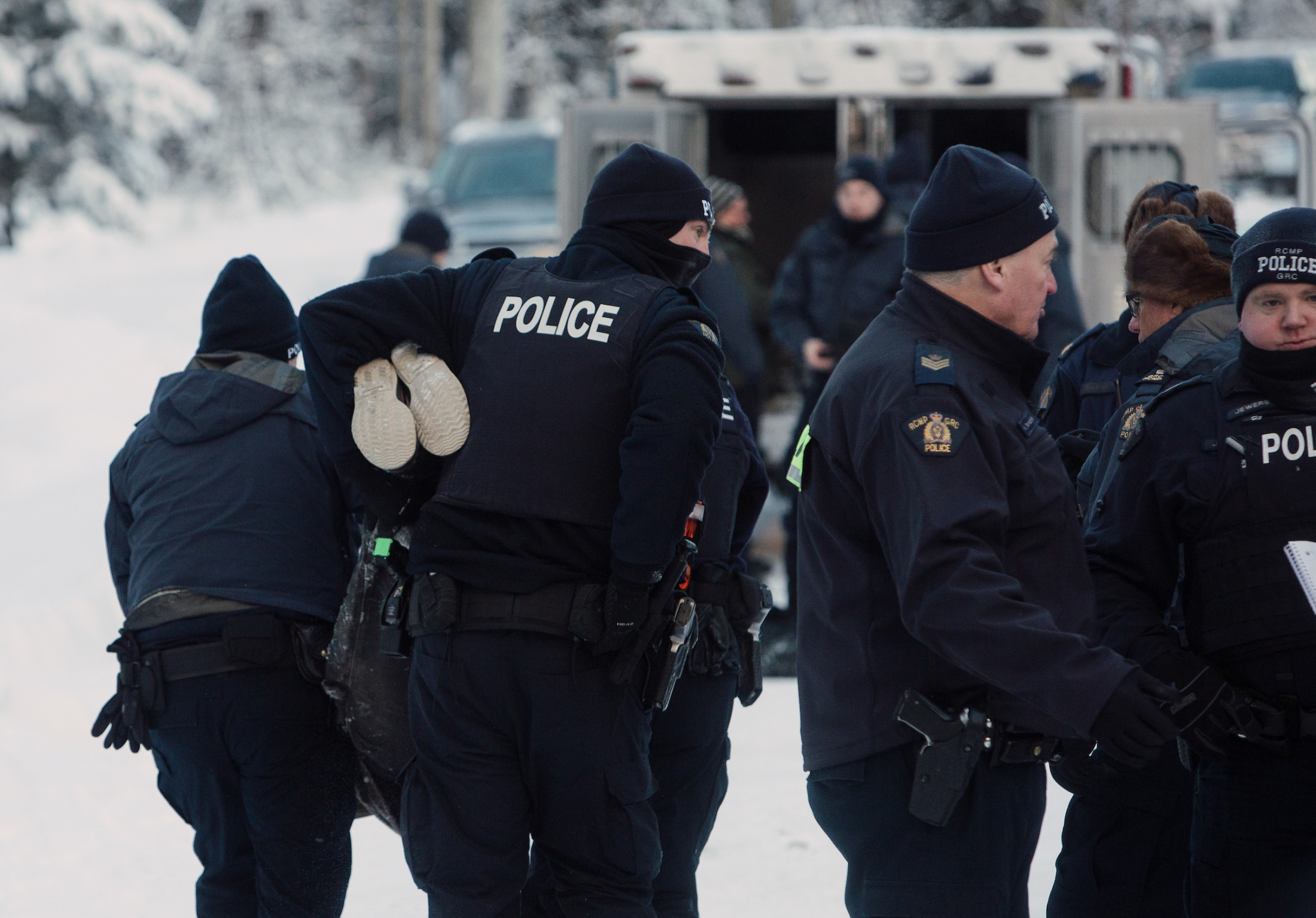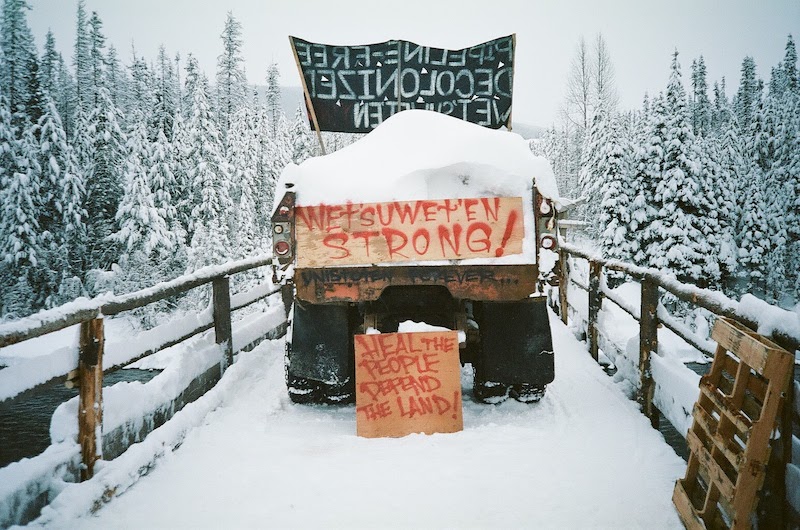Amid escalating tensions and armed RCMP responses, leaders say Canada must abide by the ‘rule of law.’ But what about Indigenous law?

Freda Huson, a matriarch and chief of the Wet’suwet’en, puts charcoal on a supporter’s face at the Unist’ot’en camp in preparation for ceremony. Huson and supporters were awaiting arrest by the RCMP during the enforcement of a Coastal GasLink injunction. Photo: Amber Bracken / The Narwhal
Dozens of arrests. A week-long raid on Wet’suwet’en camps. Grainy videos of armed officers. Doors blocked at the B.C. legislature. Railways stalled across the country.
For a conflict that began in a remote place, the impacts of the Wet’suwet’en hereditary chiefs’ opposition to the Coastal GasLink pipeline are now reverberating across the nation.
As tensions flare and politicians seize on the moment to criticize their adversaries, one has to ask: was this escalation inevitable, or could it have been avoided?
Molly Wickham, or Sleydo, from the Cas Yex House of the Gidimt’en Clan of the Wet’suwet’en, said the escalation around Coastal GasLink “definitely” could have been avoided if the province adapted its decision-making processes to acknowledge and honour Indigenous law and legal customs.
“The province and the federal government have to come to the table and say ‘okay, this is how we are going to adapt our policies and our laws to include, or to adjust for, how you’re living your laws out on your land,” Wickham told The Narwhal on a phone call from Smithers.
“It’s not something we can come and negotiate. It’s something that they need to make space for.”
A 2018 decision released by federal court Justice Sébastien Grammond emphasized that Indigenous law does not exist in opposition to Canadian law, but is a part of it: “Indigenous legal traditions are among Canada’s legal traditions. They form part of the law of the land.”
Indigenous law and ‘the rule of law’
While Premier John Horgan and Prime Minister Justin Trudeau have both responded to the crisis saying Canada must remain a country under “rule of law,” some critics say they are excluding Indigenous legal systems from the equation.
For Chief Nick XEMŦOLTW̱ Claxton of Tsawout First Nation, the persistent failure of colonial governments and project approval processes to incorporate Indigenous perspectives was also on display in the approval of the Trans Mountain pipeline.
Several First Nations argued the federal government failed to engage in good-faith consultations in the pipeline project’s review, but the Federal Court of Appeals struck down their legal challenge.
Claxton said the issue comes down to how Indigenous governance continues to be treated as secondary.
“It’s really that deeper, fundamental recognition and respect for Indigenous laws, Indigenous sovereignty, Indigenous nationhood that needs to happen. And [Wet’suwet’en] is just one example of that not happening,” he said.
Indigenous communities are often forced to fight expensive and protracted battles against major natural resource projects on their territories in the courts. In many cases, projects forge ahead while legal questions of Aboriginal rights and title are still being addressed.
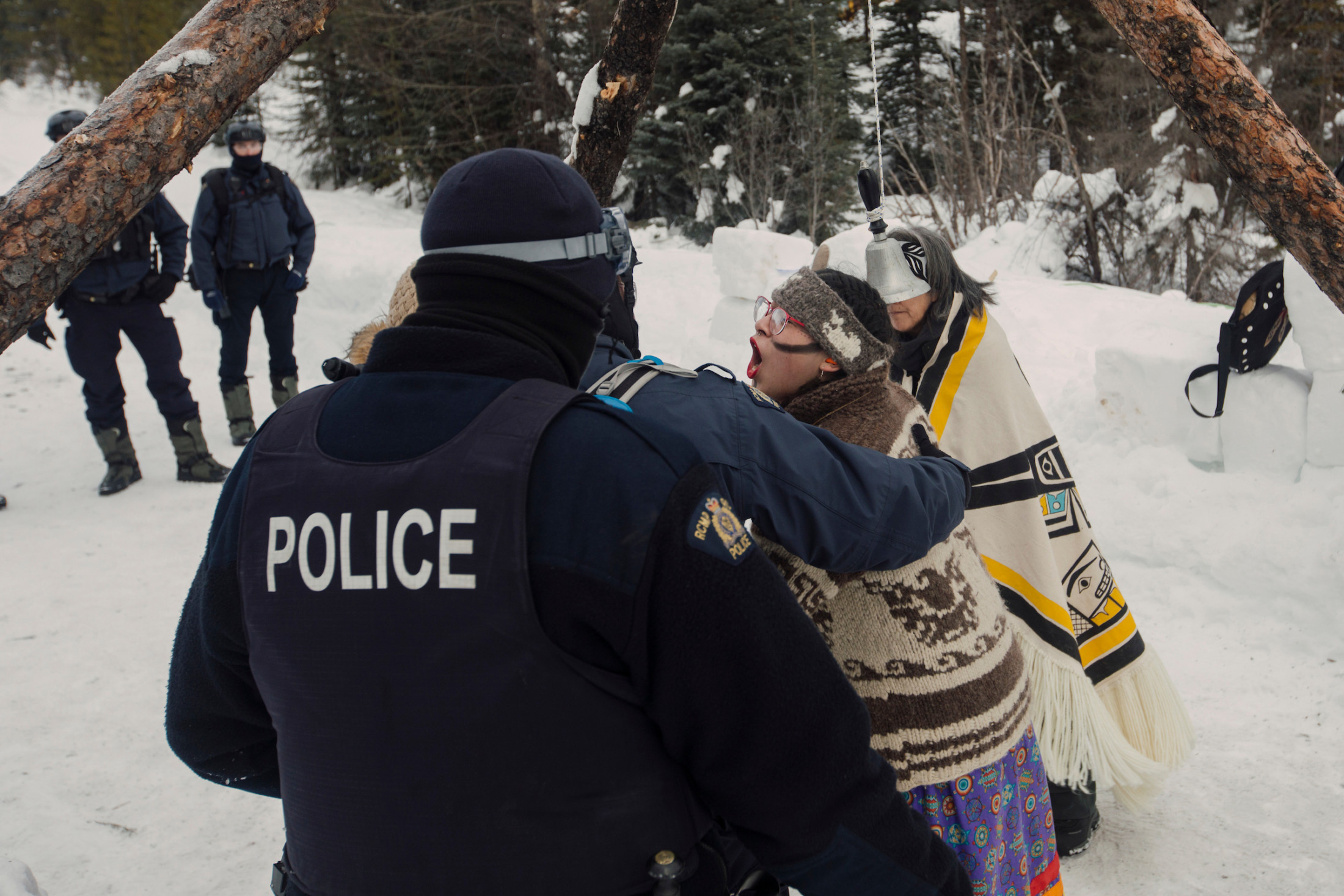
A woman is arrested as police enforce Coastal GasLink’s injunction at Unist’ot’en Healing Centre near Houston, B.C. on Monday, February 10, 2020. Photo: Amber Bracken / The Narwhal
No ‘cookie cutter’ solution: lawyer
Lawyer Jack Woodward, well-known for drafting Section 35 which enshrines Indigenous rights in the Constitution, has represented numerous First Nations in landmark cases.
Although imperfect, Woodward said Canada’s courts have some of “the most extensive accommodation for Indigenous laws in the world.”
“It’s hard to criticize — we’re in its infancy,” he said. “But it’s as enlightened as you’re likely to get in democratically elected societies in the modern world.”
To Woodward, the Wet’suwet’en crisis could have been avoided had the new trial that the court called for after the 1997 Delgamuukw decision simply taken place to resolve unanswered questions.
In Delgamuukw, the Supreme Court of Canada recognized the Wet’suwet’en and Gitxsan Peoples had never surrendered their land or had their title extinguished. The decision recognized Aboriginal title, the right to actively manage the land and benefit economically from its use, but that such title must be proven in the courts. The decision also ruled Aboriginal title is a communally held right that the province does not have the power to extinguish.
But the Delgamuukw decision left some room for infringements on Indigenous title for industry — agriculture, forestry, mining, hydroelectric power and infrastructure — and general economic development if these infringements can be justified (it’s complicated).
These infringements must be justified through the courts, which has not happened for the Coastal GasLink project.
The court also did not rule on the question of self-government or where exactly the Wet’suwet’en and Gitxsan hold title.
“The appellants effectively argued on appeal, as they did at trial, that by virtue of their social and land tenure systems — consisting of Chief authority, Houses, feasts, crests, and totem poles — they acquired an absolute interest in the claimed territory, including ownership of and jurisdiction over the land,” ruled Chief Justice Antonio Lamer. “The problem with this approach is that it requires proof of governance and control as opposed to proof of general occupation of the affected land. Only the latter is the sine qua non of ‘Aboriginal title.’ “
Lamer said this “substantive defect” in the Chiefs’ arguments required a new trial, which the court welcomed but the Wet’suwet’en have yet to bring forward.
So while the Delgamuukw decision set precedent for recognizing title, other questions were left unanswered in terms of how provincial and federal policy might adapt.
But Woodward brings insight to the Wet’suwet’en situation from another, similar case: Tsilhqot’in Nation v. British Columbia.
That 2014 decision granted the Tsilhqot’in Nation title to 438,000 hectares of its traditional territory. It took the Tsilhqot’in a quarter century to see its legal challenge all the way through to the Supreme Court of Canada. Both the province of B.C. and the federal government fought against the claim.
While it was one of the longest and most expensive court cases in Canadian history, Woodward said since B.C. and Ottawa were ordered to pay their legal fees in the end, the case didn’t wind up costing the Tsilhqot’in.
Woodward said the provincial and federal governments face a “legal revolution” in their ongoing efforts to recognize and incorporate Indigenous governance. For him that makes conflict unsurprising, especially as communities wrestle with the uncomfortable legacy of the Indian Act and jurisdictional issues that can only be resolved internally — such as disagreement within Wet’suwet’en about who are the rightful hereditary chiefs.
Woodward said there is no “cookie cutter” solution going forward, since First Nation governance and customs vary.
He said some of the conflict in B.C. could be resolved if the province and federal government let go of their “urgency” to push forward Coastal GasLink, especially in light of decades-old questions of jurisdiction.
“The gas has been underground for tens of millions of years,” he said. “It could wait a year or two, and the government could offer assistance that has risen from decades of neglect.”
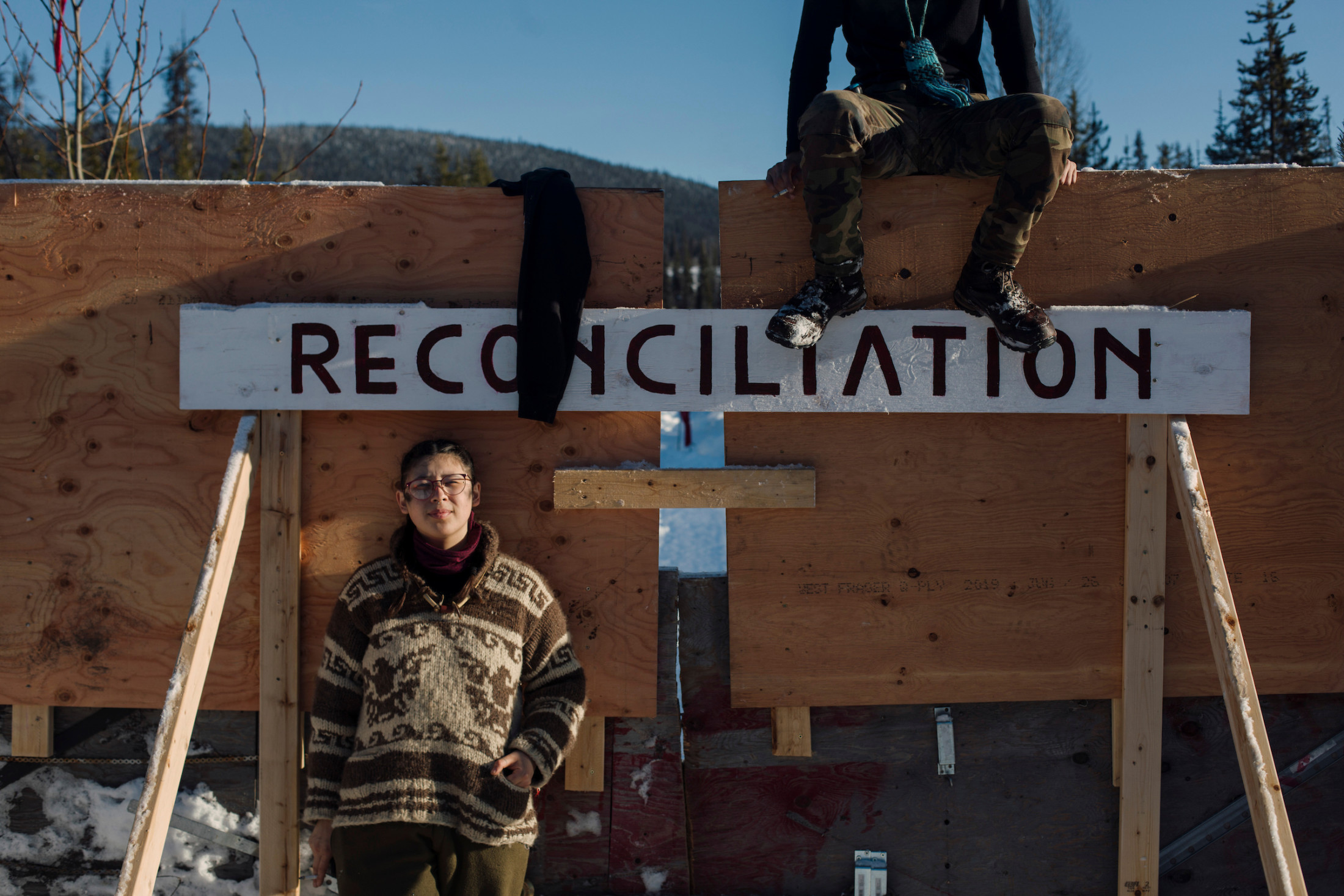
Supporters stand along a sign built across the Morice River bridge near the Unist’ot’en camp near the route of the Coastal GasLink pipeline, Feb. 8. Photo: Amber Bracken / The Narwhal
The B.C. government’s approval of LNG subsidies
MLA Adam SȾHENEP Olsen, the first W̱SÁNEĆ (Saanich) citizen to be elected to the B.C. legislative chamber, and the interim leader of the Green Party, also agrees the Wet’suwet’en conflict was avoidable.
“It is important that people understand that what we see across Canada and on the steps of our legislature was neither inevitable nor unavoidable,” he said to his colleagues in the house on Feb. 12.
Olsen said votes in the spring of 2019 to support the Income Tax Amendment Act, which provides tax breaks to LNG Canada, the project the Coastal GasLink pipeline is needed to feed, fuelled the Wet’suwet’en controversy.
“Every member of this chamber, with the exception of the B.C. Greens and our independent colleague [Andrew Weaver], voted to ignite the tragic situation that we face.”
Olsen, the only party leader to visit Wet’suwet’en territory this year, chastised his colleagues at the legislature after parliament opened Feb. 11 with a speech from the throne, written by the premier’s office but delivered by Lt.-Gov. Janet Austin.
The speech referenced steps towards “meaningful reconciliation” with Indigenous Peoples in B.C., including the passage of Bill 41 to implement the United Nations Declaration on the Rights of Indigenous Peoples.
Austin delivered these words as hundreds of members of the public gathered outside the legislature, supporting a group of Indigenous youth occupying the building’s steps for the previous days in support of Wet’suwet’en hereditary chiefs. The crowd blocked every entrance to the legislature, forcing the cancellation of a red carpet ceremony and gun salute traditionally conducted at the opening of a new session.
In a response speech the following day, Olsen accused the Liberals and NDP of choosing to “barrel ahead, knowing full well that there were existing long-standing and unresolved matters relating to rights and title in the area.”
“Honestly, what did you all expect?” he asked. “Did you really think that after decades of fighting for recognition, the Wet’suwet’en hereditary chiefs would just step aside and let you do whatever you want in their territory?”
“Every vote to prematurely proceed with this project backed the Wet’suwet’en hereditary chiefs into a corner.”
“I will not let them rewrite history to pretend that they are anything but responsible for the painful situation we are seeing playing right now in our landscape, leveraging Indigenous people against each other,” Olsen said.
Indigenous-led environmental assessments could ease tensions
Divides over natural resource projects could also be avoided by bringing Indigenous communities more thoughtfully into the environmental assessment process, where project impacts and environmental concerns can be discussed in the early stages of a project’s life, rather than post-approval or during construction.
Yet recent research found that environmental assessment policies in Canada have failed to adapt in the wake of important legal decisions like Delgamuukw and Tsilhqot’in.
A new study published by Laruen Eckert, Raincoast Conservation Fellow and PhD student at University of Victoria, Chief Claxton and co-authors found Indigenous knowledge has largely been left out of decision-making processes, even after the controversial Impact Assessment Act was passed by the Liberal government in 2019.
The authors analyzed the bill and related literature to see how it engages with Indigenous knowledge. Eckert said the law does mandate the inclusion of Indigenous knowledge but offered “few progressive changes” in how to execute that shift.
The paper concludes “top-down colonial environmental assessment processes” are “inherently at odds with equitable knowledge sharing.”
Eckert said while procedural changes, such as better funding and training opportunities for Indigenous participation in the assessment process, are within reach, the fundamental obstacles of shifting government to treat Indigenous knowledge as equal remains a daunting task.
“The deep-seated stuff is going to take a ton of political will and profound systemic change,” Eckert said.
The research also recommends more Indigenous-led environmental assessments.
Indeed, Tsawout First Nation carried out its own environmental assessment of Trans Mountain that included both data-driven and traditional knowledge. The Tsleil-Waututh First Nation also commissioned its own assessments on topics overlooked in the Trans Mountain like danger to southern resident killer whales, and the Federal Court of Appeals largely dismissed these studies.
“If we accepted those submissions, as a practical matter there would be no end to consultation, the project would never be approved, and the applicants would have a de facto veto right over it,” ruled the court.
But as Claxton addressed the National Energy Board voicing Tsawout First Nation’s opposition to Trans Mountain, he framed things a different way.
“The fact that we, as Saanich, have to testify our concerns to the National Energy Board in a process that was imposed on us about our lands and waters that were literally stolen from us, just to ultimately allow the continued expansion of the colonial capitalistic empire … it seems to me like the colonial mission is still driving forward relentlessly,” he said at a hearing in Victoria in November 2018.
Claxton says changing assessment policies will give space for Indigenous worldviews and respect for non-humans relations like salmon and southern resident killer whales.
“First Nations leading their own environmental assessment processes is a tangible way the state can engage with Indigenous legal systems,” he said.
The Impact Assessment Agency of Canada told The Narwhal the new act includes considerations for Indigenous-led assessments and they are working with First Nations to create a policy framework to ensure consistency across project reviews.
For Wickham, the Wet’suwet’en are doing their part by living out their law on the land. For now, she says the province and the federal government lack the political will to acknowledge, formally and into law, that Indigenous title is not extinguished.
“It’s not going to be easy. It fundamentally challenges the whole system that Canada is based on,” she said. “But there are ways to do it. It’s time the governments put in the time and the efforts to make it work. They have to start somewhere, and this is the most appropriate place to start right now.”

